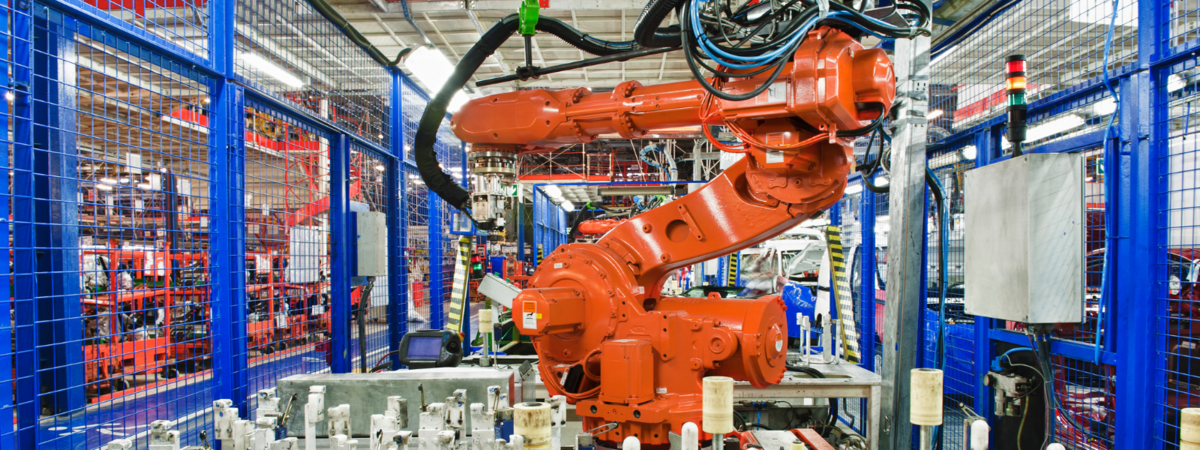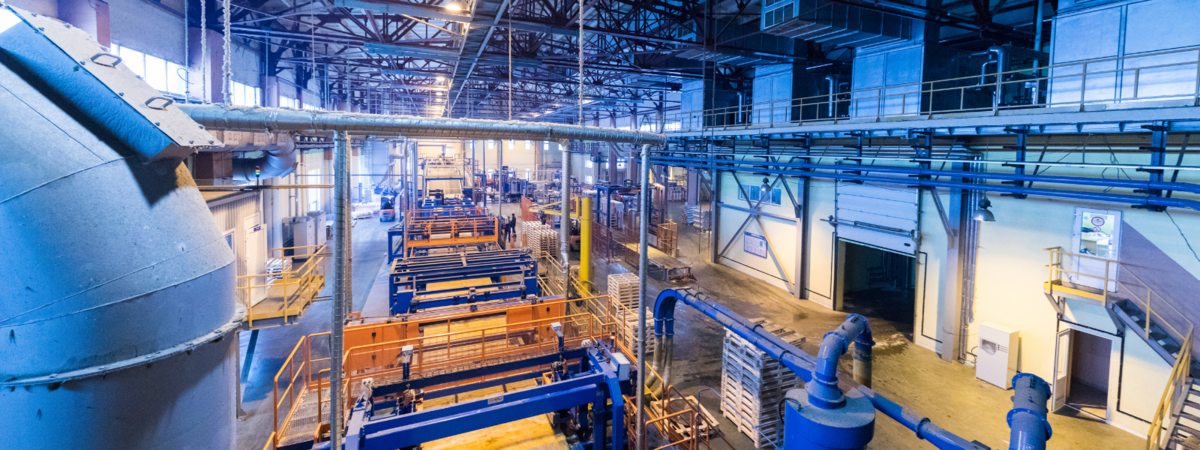6 Crucial Criteria to Consider When Choosing the Right MES System
2023-02-27
The selection and deployment of a new MES system are among the key decisions of a company. We have prepared a short summary for you on what you should focus on when choosing an MES system.

In times of increasing automation and non-stop digitization, the MES system becomes a key solution for any manufacturing operation. Choosing such an extensive software solution may not always be easy and its implementation can also be challenging.
So how to choose the MES system that best suits your operation?
The functionality of the system is one of the most important criteria, as it determines what tasks the MES system can perform. And at the same time, how well the system will perform the assigned tasks also depends on the functionality and properties of the system.
However, don't sacrifice the simplicity of use for functionality. A complex and cumbersome MES system quickly becomes more of a burden than a help. Integration is also critical because a good MES system should be able to seamlessly connect to other enterprise software solutions in your operation, as well as to production or assembly equipment.
Support and maintenance is also important aspect. Make sure you have experts available not only for outages but also for further development. Scalability is also among the criteria that should not be overlooked. Especially if you are just starting a pilot project or expect an increase and development of production.
And finally, when it comes to choosing, do not forget to take into account not only the price of the product but also "hidden" costs, such as integration or training.
Although choosing the right MES solution for your production operation may seem difficult, the following 6 key criteria will make it easier to navigate.

When choosing an MES system, these 6 key criteria should be considered:
1) goals and functionality
2) user-friendliness
3) total and operating costs
4) scalability
5) integrability
6) customer support and system maintenance
In practice, this represents the following procedure.
6 CRITERIA WHEN CHOOSING THE RIGHT MES SYSTEM
1) Define your business goals and expectations of the functionality of the new MES system
The MES system represents an excellent opportunity for companies that want to optimize, streamline and automate their production processes. By choosing and successfully deploying the right MES system, the company will be able to achieve its operational and, above all, business goals
- faster,
- more efficient
- and with fewer costs
than traditional alternatives offer.
Therefore, the first step is to create a list of expected features. Features should primarily be derived from
- performance expectations of operation
- and type of processes,
which the future MES system has to manage. This list will serve as a basic frame of reference for identifying the most suitable solutions for your operation.
2) Make sure the system is user friendly
The MES system is primarily deployed in production facilities, which are often challenging environments. This is also one of the reasons why an MES system interface should be
- ergonomic
- and user-friendly.
Another important reason for user-friendliness is the learning time. The practical interface shortens the time required for the operating personnel to become familiar with the new system and to begin to use it meaningfully. A pleasant user experience also has a psychological effect: it minimizes distaste of employees to
- the new system
- and a new way of working.
A clever interface design that takes into account how
- employees learn
- and interact with the software,
helps create a user environment where it is easy to use. Most of the verified MES systems have undergone thorough user testing.
However, you can always ask your employees for feedback on which type of MES system works best for them.

3) Consider the total costs of the project as well as the operation of the MES system
The cost of management software remains a key factor. With tenders, it doesn't work any other way. However, it is necessary to carefully review what items the submitted price offer contains. A common part of the price offer is:
- initial purchase costs,
- installation fees,
- license,
- consultations,
- training
- or ongoing maintenance costs.
The deployment of the MES system is almost always associated with additional costs; in most cases, the purchase of
- automation technologies
- and industrial facilities.
Therefore, the preparation of the budget should always be preceded by a study mapping what other equipment will need to be procured in order for the company to achieve the required performance and other set goals.
Simultaneously, it is necessary to clarify with the suppliers whether the price in the submitted offer refers exclusively to the supply of the MES system or to its operation as well. This will prevent misunderstandings and surprises that could later jeopardize your planned operating costs.
4) Make sure the system is scalable
When choosing MES systems, scalability is an important feature of the system. Operations often expand and businesses grow, so they need to be sure that their production system can adequately expand with increasing demands.
By ensuring the scalability of your new production MES system, you will be sure that the further growth of the business or its new needs will not compromise the functionality of the system, and ultimately the business.
In addition to the fact that a scalable MES system will provide the shop floor with the necessary flexibility, it is also an effective guarantee of investment protection.
MES system that is scalable will not need to be replaced if it comes to
- changes in operational or business priorities
- or expansion or reduction of the operation itself.
The scalability of the MES system also guarantees its adaptability to
- unexpected changes,
- changed customer behavior
- and new market circumstances.
5) Verify that the MES system is integrable with your enterprise software and equipment
For the successful deployment of the MES system and its flawless operation, it is crucial that it can be integrated with the already implemented company systems (e.g. ERP, WMS, MRP, CRM, and others) in your company.
It is important to take the time to research
- specifications,
- compatibility requirements
- and analytical tools.
This way you will ensure that the MES system you have chosen will work as expected when integrating with existing solutions, and in the case of automation, also with equipment.
This also applies in terms of security and data integrity. Compatibility between software helps prevent data breaches and potential malware attacks.

6) Ensure available and reliable customer support
The MES system is a relatively complex and sophisticated control software.
Even after
- problem-free deployment,
- smooth testing
- and successful training of relevant personnel
misunderstandings or non-standard operations may occur.
High-quality customer support (hotline) can ensure that even in the case of atypical or critical situations, there is no
- shutdown of the production line
- or unwanted damage to production equipment and technologies.
The standard is the provision of customer support during production shifts, if necessary, it is also possible to obtain permanent support in 24/7 mode.
In addition to customer and technical support, it is good to find out how the potential supplier performs the maintenance of the MES system.
WHAT OTHER CRITERIA ARE GOOD TO CONSIDER WHEN CHOOSING A MES SYSTEM?
a) The size of your business or operation
One of the factors you need to consider when choosing an MES system is the size of your business (or operation). If your company is classified as small and medium, you do not necessarily need the full range of functionality of the MES system.
On the contrary, in the case of an expected large-scale implementation, you will need a more robust system that
- manages to process large volumes of data in real time
- and simultaneously manage production equipment and tools flawlessly.
b) Type of operation and industry
Another factor that affects the decision-making process when choosing an MES system is the nature of your business. If you have a complex manufacturing process, you will need a system that is able to cover it completely. This can mean, for example,
- material flow management
- or managing the maintenance of equipment and tools.
MES systems can also have
- industry specifications
- and functions designed for specific production areas.
MES for automotive production is different from MES systems for pharmaceutical production or metal production. Check for what type of operation the relevant MES system is suitable for or consult with suppliers on how they can adapt the system to
- unique requirements
- and special parameters of your operation.

c) Development and investment plan
The project budget remains a determining aspect when choosing an MES system. When planning investments, it is good to also consider
- potentially modifying the functionality
- or expanding the system after its deployment,
especially if your operational strategy also includes dynamic development.
d) Required features, good-to-have capabilities, and value-added functions
Each MES system has the same basic functions and some MES systems offer extended functions.
That is also why it is important to consider whether, in addition to the functions that you absolutely need, there are also those that are not immediately necessary for managing your manufacturing but can make your work easier or more efficient.
The right combination of extended functionalities can
- accelerate return on investment (ROI)
- and improve the originally designed efficiency of the MES system.
For example, by expanding the MES system with a work and employee management module, you can automate the agenda of
- presence reports,
- professional certificates
- or depreciation of work performance
and thus relieve the operational managers from the personnel bureaucracy.
6 MISTAKES YOU SHOULD AVOID WHEN CHOOSING A NEW MES SYSTEM
1) Insufficient technological infrastructure
When choosing an MES system, the technological infrastructure is a fundamental factor in the decision-making process. If you have an outdated or non-existent infrastructure, the MES system will not be able to fully fulfill its function.
The introduction of adequate infrastructure can be part of the delivery of the MES system, but this item will inevitably affect the overall budget of the project.
2) Not defining the system entry
One of the most common mistakes when choosing a new MES system is an unclear definition of the task. Without a clear understanding of what the system is intended to achieve, it can be difficult to select the right manufacturing software and additionally, configure it flawlessly to meet the needs of your business.
Moreover, not defining the goals of the system can lead to frustration among employees who are not sure how the system is supposed to help them improve their work and thus lead to demotivation during training to work with the new system.
3) Not involving employees in the preparation process
Another mistake that is often made when choosing a new MES system is not involving employees. It is necessary to obtain information from the staff who will either directly or indirectly work with the system about what needs the MES system should complement.
Simultaneously, employees from operations are a good source of relevant suggestions that could be part of the preparation and definition of tender documentation.

4) Failing to train employees
Another mistake that should be avoided when choosing a new MES system is insufficient training of employees. It is important to provide employees with adequate training, either before implementation or during the testing phase, so that they are able to use the system correctly and efficiently.
In addition, proper training can help prevent employee frustration
- when changing work procedures
- and reduce the likelihood of errors,
which they might commit to when working with the new system or related equipment.
5) Failing to test the MES system
Part of the selection process also includes trying out the preferred MES systems. Reference visits, where you can see how the system works in real operation, are a fairly common part of the selection process.
It is also a space for monitoring the individual interfaces of the MES system
- how employees can interact with them,
- whether they are ergonomic enough for your needs
- or for your type of operation.
If possible, you can also try how the relevant MES system works,
- how responsive it is
- or the complexity of control.
6) Unprepared suppliers and third-party collaborators
Part of the implementation of the MES system is its integration on
- other business systems (mostly ERP)
- and manufacturing or automation technologies.
Therefore, the integration process inevitably represents the coordination of several suppliers not only during the implementation itself, but also during the testing of the MES system in operation.
Therefore, it is necessary to prepare the suppliers for the necessary cooperation, for example with a time schedule. The second option is to hire an integration manager or ask the supplier of the MES system to cover the entire process.

Choosing a new MES system is a rather complex process. Thorough preparation will facilitate the entire process and prevent misunderstandings and unnecessary delays in the entire procedure. If you are planning to choose a new MES system, do not hesitate to consult our consultants and analysts.







